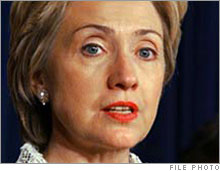By
Geoff Colvin, Fortune senior editor-at-large
(Fortune Magazine) -- America's fight - to thrive in the Darwinian global economy isn't getting any easier. But in this season of financial market upheaval and intensifying political campaigning, there's danger we could actually give up two of the greatest advantages we hold.
Those advantages are easily overlooked. Lots of people (emphatically including yours truly) worry long and loud about the global challenge. We wonder how American workers will be worth their very high price in the new global labor market, especially when our culture seems to value education less highly than some of our competitors do. We ponder the almost incredible possibility that our standard of living might even decline.
 |
| Hillary's pro-labor proposals would only temporarily aid job security. |
But we need to remember that when we've descended into these funks before - recall, for example, when Japan seemed utterly dominant in the '80s - our system has responded and prevailed. Many features of our economy and society contribute to that pattern of success, and two are especially important.
Highly flexible labor markets. U.S. companies have more freedom to hire and fire - and workers to stay or quit - than those in almost any other developed economy. So when the world changes and the elements of economic success morph - like right now - we can respond quickly.
The process is hard and painful, often accompanied by predictions of a coming apocalypse. When millions of middle managers got cashiered in the '80s, it was almost impossible to imagine that new jobs, new industries, and a growing economy would soon shrink the unemployment rate to the lowest levels ever seen.
Big, open, highly developed capital markets. Pulling capital out of yesterday's opportunities and putting it into tomorrow's is what capitalism is all about, and the winner is whoever does it fastest and best. Again, the process can be traumatic. The corporate raiders of the '80s were widely reviled at the time, except by those who invested with them; in retrospect it's clear they were doing what needed doing. U.S. capital markets have proved effective at continually channeling money to tomorrow's best use.
Those two tremendous strengths are critical in America's struggle to adapt as the world economy shifts, which makes it hard to believe that anyone might want to weaken them. But that's what's happening.
Polling shows that one of the most important issues in the presidential election will be job security. Business Roundtable president John Castellani points out that the U.S. economy is creating two million jobs a year - by destroying 15 million and adding 17 million. No wonder people are edgy. So the temptation for candidates to make counterproductive promises in the name of job security will be powerful.
Already succumbing is Hillary Clinton, who declares proudly her eagerness to intervene in labor markets. She has often called CEOs in the midst of labor negotiations, just to let them know that a U.S. Senator hopes they'll do the right thing by their unions. She opposed the Central America Free Trade Act and is frank in admitting she favors protectionism. She promises that if she's President, any new trade deals would have to include "strong labor protections." That would temporarily aid job security - and pretend we won't have to face the new realities of the global economy.
Our capital markets are now threatened by the recent credit market turmoil. Truth is, this is what markets always do - go a little nuts and then correct. This correction so far has been orderly on the whole, but it means a number of Americans with exotic mortgages are going to default, with far-ranging financial repercussions. That pain will tempt politicians to act in ways that would compromise the entire system's effectiveness.
Yes, Clinton's in the forefront again; she wants heavy new regulation of the mortgage business. But Wall Streeters are also working behind the scenes to engineer rescues of hedge funds burned by bad mortgage-related investments. Sorry, but bailouts distort the way capital gets allocated. They're exactly the opposite of what our economy needs now.
In an era of economic angst like this one, it's hard to resist the urge to make quick fixes. But when we're surrounded by tumult and it's tough to see the way forward, the genius of the system is our greatest hope. Let's protect it. 